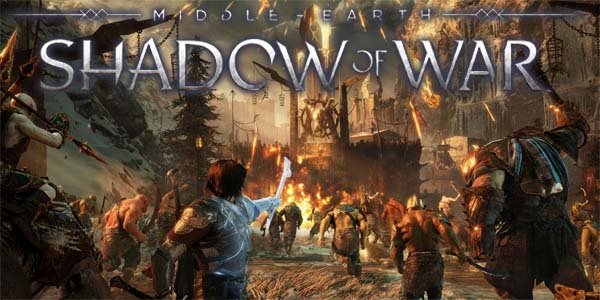
Dang. I was really hoping to have this out before the end of the year...
Shadow of Mordor was easily one of my favorite games of 2015, and one of my best reviewed games of that year, and I even cited it as an example of successful open world game mechanics. I've praised the game for its tightly-focused design, relatively limited scale, and the fact that it didn't waste the player's time with an excess of meaningless collectible hunts.
"The developers showed plenty of restraint in many areas of design so that they could focus on the innovative new feature that everything in the game revolves around. The design is tight and streamlined. They didn't waste the player's time with an excessively large, complicated map, or a multitude of irrelevant mini-games and side quests."
- from my Middle-Earth: Shadow of Mordor review
Yes, the original game did have some collectible hunts. It did have some filler content. It did have bullshit, game-y missions with arbitrary win/loss conditions. But those issues weren't pervasive enough to bring down the game as a whole, and the game generally flowed very smoothly. In their quest to mindlessly monetize the sequel, Shadow of War, Warner Brothers and Monolith have doubled down on both the best elements and the worst elements of Shadow of Mordor, and the result is beautiful when it works, and ugly when it doesn't.
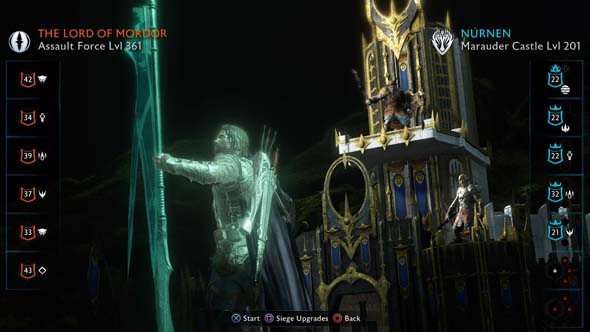
You now recruit orc captains to defend fortresses from Sauron's army.
The biggest problem is that the game now feels like a grind. In order to get you to pay for in-game, randomized micro-transactions called "War Chests", the campaign has been needlessly padded-out. Instead of having the option to hunt down uruk captains for the utilitarian purposes of gaining intel or gathering an army of mind-controlled slaves to do your bidding, you now must recruit orc captains into your own army in order to siege and then defend castles and fortresses from Sauron's counter-invasion. In principle, this sounds like a brilliant idea! I've often criticized open world and sandbox games for not having actual threats or consequences that pressure the player into acting. In fact, requiring that the player defend and hold captured strongholds from enemy counter-attacks is exactly the sort of thing that I've proposed as a compelling way to keep the game world feeling alive, and to keep the villain actually feeling threatening and antagonistic.
The problem is that (aside from one scripted castle defense) all the castle defending is back-loaded into the final act of the game. At this point, the plot is basically over, ... [More]
ae89c159-d700-491f-810c-2ed2093b5137|0|.0
Tags:Middle Earth: Shadow of War, Middle Earth: Shadow of Mordor, the Lord of the Rings, Monolith Productions, Warner Brothers Interactive Entertainment, J.R.R. Tolkien, Talion, Celebrimbor, orc, undead, wraith, elf, Middle Earth, Sauron, Shelob, Brûz The Chopper, action, open world, sandbox, parkour, RPG, micro-transaction, war chest, loot box, eBay

Even though the player character in Dark Souls can be in a "hollow" state, the player never truly goes hollow. At least, not in the sense that NPCs and enemies have gone hollow.
According to Dark Souls' mythology, the undead are condemned to repeatedly wander Lordran in search of a cure, being unable to permanently die. But for virtually all such undead, this quest is futile. An undead can temporarily stave off hallowing by absorbing souls or infusing themselves with the humanity of someone else. Eventually, an undead dies one too many times, or is worn down by the daily grind of collecting souls, and loses the will to go on -- or is simply unable to continue collecting souls and humanity. When this happens, that undead becomes hollow, loses his sanity and free will, and continues to wander the world as a mindless zombie attacking any un-hollowed that it encounters on sight.
It is unknown how many "Chosen Undead" are brought to Lordran or the Undead Asyulm, but the Crestfallen Warrior at Firelink tells us that many have come before you. Is it possible that all hollows in Lordran were at some point "Chosen Undead", tasked by Frampt to retrieve the Lordvessel and re-kindle the dying flame?
Probably not.
A great deal of the hollows that you encounter in the game were likely former residents of Lordran, and there was no need to select a "Chosen Undead" until Gwyn's power faded to a "cinder", and the fire began to die. This presumably took a very long time - a whole "age".
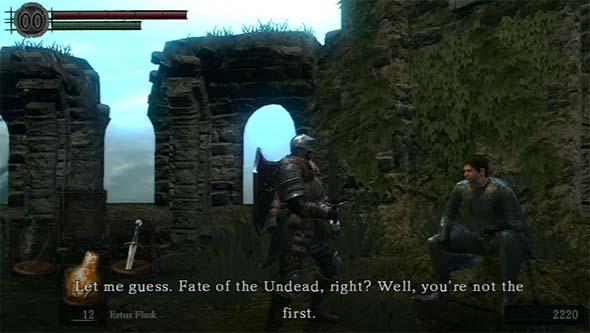
The Crestfallen Warrior informs us that we are not the first "chosen undead",
and suspects that we won't be the last either.
Avoiding hollowness with purpose
Many undead adventurers wandered into Lordran (or were abducted and taken there), and they struggle to hold onto their precious humanity for as long as possible, fighting for their lives in the fear that they, too will go hollow. Some, like the Crestfallen Warrior, resign themselves to the inevitability of hollowness, and find a sense of purpose in warning other new arrivals that they, too, are doomed. Others pursue some seemingly impossible goal or objective in the hopes that the journey will provide them with the sense of purpose necessary to avoid (or at least delay) hollowing. And yet others have taken up crafts or vocations such as blacksmithing, vending, or guarding something in order to keep them focused and avoid hollowing (and to exchange goods or services for the very souls that they need to stave off the hollowing). Keeping such a goal may help keep an undead partially lucid, but they also seem to begin to forget everything else, and only the knowledge of their quest or craft remains. Perhaps, the undead guarding various areas of the game were, at one point, tasked with protecting that place (or something within that place), but have long since lost their mind, and only that compulsion to defend has remained.
Going on "one final quest" seems to provide adventurers with enough focus to hold back hollowing.
But hollowing isn't just a thematic element reserved for non-player characters; hollowing is also a mechanic in the game that affects the player. Whenever the player character dies, you are reborn at the last bonfire in a hollowed state, unable to summon help from allies until you restore your humanity through the consumption of someone else's humanity. In Dark Souls II, hollowing further handicaps the player by cummulatively reducing your total health each time you die, and only restoring your humanity can refill your health meter. In both these cases, the player is not truly hollow; you are only in a state of partial hollowing.
It's unclear whether non-player characters are able to die and restore their humanity, or if deaths contribute to an irreversible progression towards hollowness. There are, after all, apparently hollowed NPCs such as the undead merchant in the Undead Burg and blacksmith Lenigrast in Majula who are sane enough to have kept their shops open. The presence of NPC summon signs hints at the possibility that they, too, are capable of restoring their own humanity through the same mechanisms that you can, but the game itself justifies this with ambiguous appeals to "time distortion" and hypothetical parallel realities that obfuscates the matter - particularly where Solaire and Lautrec are concerned.
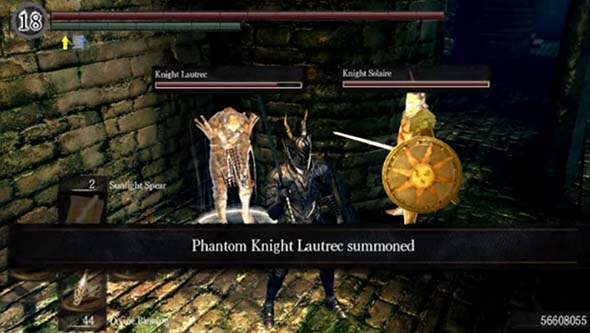
Summoned NPCs may recover humanity as you do, or they're from another time or dimension, or both.
Solaire's dialogue refers to "heroes centuries old phasing in and out.". Solaire may be using the words "world" and "time" interchangeably. This seems to be the game's justification for how summoning works: you may be literally summoning someone from a bygone era into your own time period. Anytime, you are summoned to someone else's world, you are also being transported to another time (past or future, depending on whether or not you finish the game). Solaire and Lautrec seem to somehow come from another time or dimension, but other characters definitely seem to exist within your world and time: Andre, the Crestfallen Warrior, Rhea and her companions, Big Hat Logan and his apprentice, and so on are all undead who have seen many other "Chosen Undead" come to Lordran seeking their destiny.
In any case, it's not until an undead "gives up" that the hollowing process becomes complete. What do we mean by "giving up"? For an NPC, it means that they gave up on life and went hollow, and the player typically ends up putting them down. For the player, it means that you stop playing the game. As long as you continue to play the game, then your character will continue to hold onto a sliver of humanity and maintain his or her sanity for a little while longer. When you put down your controller for the last time, you have condemned your character avatar to finally succumbing to hollowness, whether you recognize it or not... [More]
ce0263eb-66fa-4c8b-b624-2655b7809cd6|3|4.7
Tags:Dark Souls, Dark Souls II, Scholar of the First Sin, Demon's Souls, From Software, undead, Lordran, Drangleic, hollow, hollowing, humanity, souls, zombie, Solaire, Lautrec, Blacksmith Lenigrast, Crestfallen Warrior, Andre of Astora, Rhea of Thorolund, Seigmeyer of Catarina, Big Hat Logan, Gwyn, Sunlight Maggot, God of War, covenant, Warrior of Sunlight, Gravelord Servant, vagrant, perma-death, NPC, lore, Dragon's Dogma, pawn, online, multiplayer, PSN, XBox Live, Steam, emergent narrative
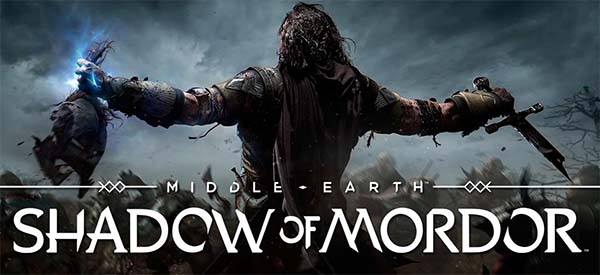
Shadow of Mordor was a game that almost sold me on the next gen consoles. I knew I was going to need a PS4 for Bloodborne, and I was very tempted to buy one early so that I could play Mordor. The central game mechanic of orc NPCs fighting amongst each other in order to become Sauron's personal favorite sounded like an interesting mechanic for organic story-telling. It was a concept that sounded like something truly deserving of the name "next gen". The biggest thing that held me back was the fact that the game was also available on last-gen consoles, so I figured it probably wasn't pushing any serious boundaries of game design.
Bat-Assassin's Creed: Arkham Middle Earth
The basic gameplay is highly derivative of Assassin's Creed and the Batman Arkham games. It ports both of these feature sets more or less as competently as those original games, including the same perks and problems. The free running feature suffers from the same lack of control that plague's Assassin's Creed, in that it's sometimes hard to predict exactly where the character will land, and he loves to climb up a wall if you run too close to it. Is it really that hard to allocate a dedicated "climb" or "jump" button?! In Mordor's defense, every button on the controller is mapped to something, so at least it has an excuse (unlike Assassin's Creed with its redundant jump button).
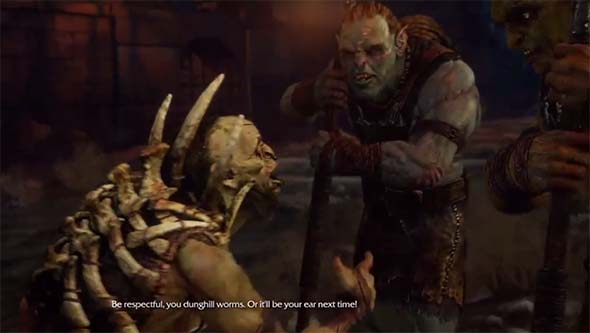
The martial culture of the orcs means that when they find a dead comrade,
they assume he was murdered by an ambitious peer, leaving the player off-the-hook.
Stealth mechanics work pretty well; although the orcs are a bit oblivious to my movements through the game world. Sometimes, I can be moving right across their field of vision within 10 feet of them, but because I'm crouched or hanging off a wall, they just don't see me. Orcs don't care much about each other. Their martial culture means that when they find a fellow orc dead, they assume that he was killed due to his own stupidity, or in a brawl / duel with another orc. This removes the need to drag and dispose of bodies while also masking the fact that orcs don't look for the player when they find a dead body. There are examples of stealth games in which enemy guards don't notice or care about dead bodies that they find, and that's always immersion-breaking. Shadow of Mordor cleverly turns what could have been an immersion-breaking limitation of the A.I. into an appropriate element of the world and narrative. As long as they don't actually see you kill their fellow orc, you can rest assured that throwing an archer off a ledge won't alert any guards who pass below to your presence.
Combat mechanics are almost identical to Arkham Asylum, except you have an ethereal bow instead of all the gadgets or grappling hook. But it also blends some elements of Assassin's Creed insta-kills into the fighting mechanics as well. Fights are much more challenging than in Assassin's Creed because you can't insta-kill enemies when you parry them. Instead, you can stun them and then perform an execution or coup de grace, but you're not impervious during this time. You have to time your coup de graces appropriately in order to avoid being hit in the middle of slitting a prone orc's throat. There are insta-kill special attacks that behave a bit more like Assassin's Creed's counter kills, but you have to build up a combo streak before they become available.
Executing a coup de grace [LEFT] on a single orc in a mob requires split-second precise timing.
Or you can perform a combat execution [RIGHT] mid-combo if you get your hit streak high enough.
Attacks are fluid, controls are responsive, timing is tight, and you can counter or dodge out of any single attack or action. This all combines to give the player a tremendous sense of control as long as you are patient and deliberate in your button-pressing. The strict timing will severely punish you for button-mashing, which makes the combat challenging and satisfying throughout the game. [More]
e19c6919-e126-48e1-86f1-53470b917754|2|3.0
Tags:Middle Earth: Shadow of Mordor, the Lord of the Rings, Monolith Productions, Warner Brothers Interactive Entertainment, J.R.R. Tolkien, orc, undead, wraith, elf, Gollum, Smeagol, Mordor, Middle Earth, Sauron, Lathariel, women, equality, gender equality, action, open world, sandbox, parkour, RPG, movie tie-in
|

| 12 | | | | | | | 60 | | 11 | | | | | | | 55 | | 10 | | | | | | | 50 | | 09 | | | | | | | 45 | | 08 | | | | | | | 40 | | 07 | | | | | | | 35 | | 06 | | | | | | | 30 | | 05 | | | | | | | 25 | | 04 | | | | | | | 20 | | 03 | | | | | | | 15 | | 02 | | | | | | | 10 | | 01 | | | | | | | 05 |
|